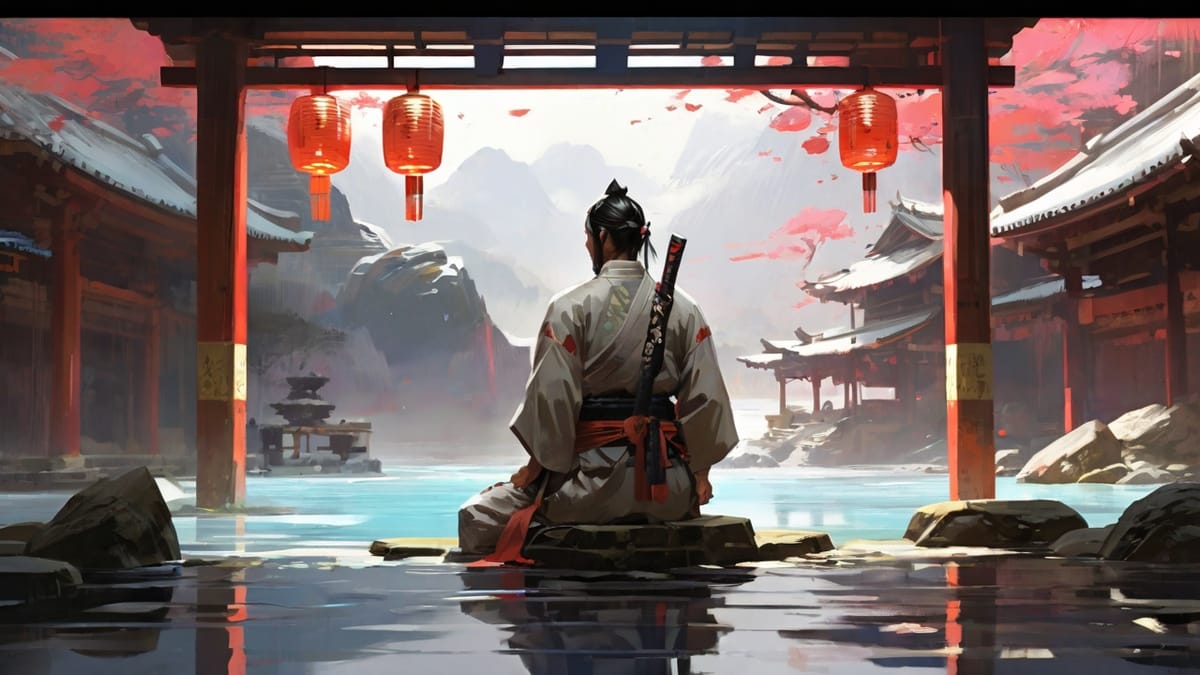Or the not-so-secret art of how to do less and achieve more
In the Western world, we usually link success and achievement to hard work, perseverance, and determination. We're taught to always keep grinding, pushing, and striving to reach our goals.
But Eastern philosophy introduces a different concept that challenges this mindest – Wu Wei.
This intriguing concept has fascinated people throughout history. And it still offers valuable insights for today.
In this article, we’ll take a closer look at what Wu Wei is all about, its history, and the key principles behind it. We’ll also explore how it has influenced various traditions and cultural practices, along with its modern-day uses in our everyday lives.
What is the meaning of Wu Wei in a nutshell?
Wu Wei (无为 / 無為) is the practice of aligning ourselves with the natural flow of life instead of resisting, fighting against, or trying to control it.
It often translates to "non-action" or "effortless action." But this doesn't mean being lazy or inactive. Instead, Wu Wei means acting in harmony with our surroundings and letting things unfold naturally. Without forcing them. It's a state of being in which you act without struggle, effort, or resistance.
A short journey through history and evolution of Wu Wei
The Chinese philosophy of Wu Wei is central to Eastern thought and culture, reflecting a journey of spiritual discovery and connection to the universe.
Originating in ancient China, it began as a reflective practice among Daoist sages seeking to understand life's natural rhythms. This philosophy, linked mainly to Daoism, has influenced many parts of Chinese culture—from martial arts to poetry—captivating practitioners and seekers worldwide. And it has also impacted schools of thought like Zen Buddhism and Confucianism.
Today, the concept of effortless action resonates globally. Helping people find balance in the middle of chaos.
Force is followed by loss of strength.
This is not the way of the Dao.
That which goes against the Dao
comes to an early end.
– Laozi, Daodejing, Chapter 30
So, how did this fascinating philosophy come to be? Here's a brief overview:
- Ancient Origins: Wu Wei first popped up in written sources during the Spring and Autumn period (770-481 BCE), a time filled with political instability and social change. It appears in early works like the Classic of Poetry. And later it becomes an important concept in the Confucian Analects, Chinese statecraft, and Daoism.
- Influence of Daoism: Wu Wei is a key idea in Daoism. Early Daoist texts, especially from thinkers like Laozi and Zhuangzi, stress the importance of going with the flow of nature. They highlight the need for harmony with the Dao (道 – the Way) instead of pushing against it. This concept encourages people to embrace spontaneity and be flexible in their lives.
- Interaction with Buddhism: As Buddhism spread across China, the concept of Wu Wei mixed with Buddhist teachings (e.g., Chan Buddhism). This led to fresh interpretations and lively philosophical debates. Making the philosophy even more popular.
- Cultural Integration: Over the centuries, Wu Wei has made its way into different parts of Chinese culture. Impacting martial arts, poetry, art, and other traditional practices. And reflecting the natural bond between human beings and the universe.
- Modern Interpretations: Today, Wu Wei connects with lots of areas like psychology and self-help. Encouraging us to move away from nonstop hustle and instead embrace ease and flow in our everyday lives.
- Global Reach: As more people explore Eastern philosophies, the ideas of Wu Wei are sparking a greater interest in mindfulness, meditation, and other practices that encourage living in tune with the natural rhythms of life.
7 key principles of Wu Wei
At its core, Wu Wei has several main principles that shape the way we can approach life. These include:
Simplicity
Simplicity in the context of Wu Wei means living in a way that is free from excessive desires, attachments, and complexities. By simplifying our lives and focusing on what truly matters, we can find inner peace and balance.
Here are a few examples of how you can apply this principle in your daily life:
- Declutter your living space and getting rid of unnecessary possessions
- Limit your use of technology and social media to reduce distractions and noise
- Simplify your schedule by saying "no" to activities or commitments that don't align with your values or bring you joy
In today’s world, where we often chase material stuff and status, embracing simplicity can be tough. But by clearing out unnecessary distractions and decluttering both our physical and mental spaces, we can make room for more meaningful experiences.
Inner peace
Inner peace is a state of tranquility and contentment within oneself. It's the result of letting go of our attachments to outcomes and embracing the present moment. Wu Wei teaches us that inner peace comes from finding balance and harmony within ourselves.
Here are some practical ways to cultivate inner peace in your daily life:
- Practice mindfulness and being fully present in each moment
- Cultivate gratitude for what you have instead of constantly chasing more
- Let go of worries about the past or future, and instead focusing on what you can control in the present
Of course, inner peace is not something that can be achieved overnight. It takes practice and effort to let go of our attachments and find balance within ourselves. But by incorporating these practice into your daily routine, you can gradually cultivate a sense of inner peace.
Spontaneity
The principle of spontaneity encourages us to let go of rigid plans and expectations. And instead allow life to unfold naturally. By being open to new experiences and embracing change, we can find joy in unexpected moments.
Here are some ways to embrace spontaneity in your daily life:
- Be open to new ideas and perspectives from others
- Try new activities or hobbies without overthinking them
- Let go of the need for control and allow things to happen naturally
Spontaneity may seem scary at first, especially if you're someone who likes to plan every detail of their life. But by practicing letting go and being open to what comes our way, we can experience more joy and excitement in our lives.
Effortless action
Effortless action means taking action without force or struggle. And instead going with the flow of life. By letting go of our need for control and allowing things to happen naturally, we can achieve more with less effort.
Here are some ways to practice effortless action in your daily life:
- Focus on the journey rather than the end goal
- Let go of perfectionism and embrace imperfection
- Trust in the process and let things unfold at their own pace
By practicing effortless action, we can reduce stress and anxiety caused by constantly striving for perfection or trying to control every aspect of our lives.
Harmony with nature
In Wu Wei, nature is seen as the ultimate teacher. By observing and learning from nature its natural rhythms (basically the Dao), we can find balance and harmony in our own lives. This principle encourages us to live in harmony with the natural world and embrace its cycles.
Here are some ways to incorporate this principle into your daily life:
- Spend time in nature regularly
- Observe the changing of seasons and learn from their rhythms
- Practice eco-friendly habits such as reducing waste and conserving energy
Nature teaches us that everything has its time and place. And by living in harmony with it, we can find balance within ourselves.

Action without desire
When used the wrong way (which is pretty common in our society), desire can be a source of suffering and attachment. By letting go of our desires and instead focusing on the present moment, we can find contentment and peace.
Here are some ways to practice action without desire in your daily life:
- Engage in actions without a specific goal
- Let go of expectations and attachments to outcomes
- Practice detachment from material possessions or status symbols
By practicing action without desire, we can free ourselves from the constant need for more and find contentment in what we already have.

Action through non-action
This principle implies that sometimes not taking any action is the best course of action. Instead of trying to force a situation, it can be better to just let things play out and see how they turn out. This doesn't mean being passive, but rather trusting in the natural flow of life and knowing when to take action and when to let go.
Here are some ways to practice action through non-action in your daily life:
- Practice patience and trust in the process
- Embrace moments of stillness and quiet reflection
- Let go of overthinking or trying to control every outcome
By finding the balance between taking action and letting things unfold naturally, we can reduce stress and find greater peace within ourselves.

Wu Wei examples in different traditions and schools of thought
We've already touched upon that Wu Wei has influenced different cultures and practices. But let's dive a little deeper into its impact on specific traditions and schools of thought.
Here are some examples:
- Daoism: Daoism, the foundation of Wu Wei, talks about going with the flow and finding inner peace through many key texts. Laozi's teachings in the Daodejing (道德經/道德经) shine a light on Wu Wei as a way to connect with nature and live in harmony with the Dao. And the Zhuangzi (莊子/庄子) also presents this idea, focusing on effortless action and acting without desire.
- Zen Buddhism: When Chan Buddhism arrived in Japan in the 12th century, it transformed into Zen Buddhism – a school of thought that focuses on meditation and mindfulness. In Zen Buddhism, Wu Wei is known as "action through non-action." It emphasizes living in the present moment and letting go of expectations to find inner peace.
- Confucianism: While many see Confucianism as a more structured and disciplined school of thought, it also holds elements of Wu Wei. Ideas like benevolence (ren 仁) and proper conduct (li 禮/礼) focus on achieving balance, harmony, and inner peace both personally and in society—principles that align with Wu Wei.
Wu Wei examples in art and culture
Wu Wei's influence extends beyond philosophy and religion, reaching into art and culture as well. Some of the ways in which it has impacted different forms of art and culture include:
Aspect | Impact |
|---|---|
Statecraft | Wu Wei has made a mark on politics and statecraft. The idea of ruling through non-action was popular in ancient China. Emperors were encouraged to take a hands-off approach and let things play out naturally, which aligns with the principles of Wu Wei. |
Calligraphy | The art of calligraphy in China highlights effortless movement and flow. This embodies the principles of Wu Wei. Calligraphers must release control and connect with the brush to create beautiful strokes. |
Martial Arts | Wu Wei also plays a big role in traditional Chinese martial arts like Tai Chi (taijiquan 太極拳/太极拳) and Baguazhang (八卦掌). These practices focus on using minimal effort and flow in movements, embodying the principles of effortless action. |
Tea Ceremony | The traditional Chinese tea ceremony is a practice that embodies Wu Wei. It encourages participants to let go of distractions and be present in the moment. Savoring each sip of tea with mindful awareness. |
Literature and Poetry | Wu Wei is a key theme in Chinese literature and poetry, showcasing effortless beauty and a strong connection with nature. Poets often capture spontaneous bursts of inspiration, focusing on simplicity and subtlety, encouraging readers to think about the balance between human emotions and the ever-changing landscapes of life. |
Traditional Chinese Medicine | The principles of Wu Wei are also seen in Traditional Chinese Medicine (TCM), which focuses on balance and harmony in the body. TCM practitioners take a holistic approach to health, focusing on aligning your lifestyle with natural cycles. And promoting gentle, non-intrusive healing methods. They often suggest preventive measures that align with our natural rhythms instead of pushing for big changes. |
These are just a few examples of how Wu Wei has shaped art and culture, highlighting its lasting influence and relevance in different settings. Its principles still inspire people to seek a more harmonious and balanced life, both inside and out.
Maybe that's why Wu Wei is such an important idea in Chinese philosophy—it encourages us to let go of our ego-driven desires and go with the natural flow of life, leading to inner peace and real fulfillment.
How to practice Wu Wei in modern daily life
Although Wu Wei might seem tough to wrap your head around in our fast-paced, goal-driven world, it's definitely possible to weave its principles into our everyday lives. I've been doing it for 18 years now. It's a concept you can apply to every aspect of your life, from the personal to the professional.
Here are just a few examples of life areas where you can incorporate its principles to find more balance and peace:
Personal relationships
In our relationships with others, Wu Wei teaches us to let go of the need for control or trying to change others. Instead, we can focus on being present and accepting them as they are. This can lead to stronger, more harmonious relationships.
Example: Instead of trying to change your partner, you listen and seek to understand their perspective. And you trust that by doing so, things will naturally fall into place.
Personal development
In our personal development journeys, Wu Wei reminds us to trust in the process and let things unfold naturally. By living in alignment with our true selves and not forcing change, we can achieve personal growth and fulfillment easier.
Example: Instead of setting rigid goals and timelines, you focus on being present and let your personal growth unfold naturally.
Health/Wellness
Wu Wei also has practical applications for our physical and mental well-being. By practicing mindfulness, letting go of attachments to outcomes (e.g. having a great-looking body), and living in harmony with our own natural rhythms, we can improve our overall health and wellness.
Example: Instead of pushing yourself to the point of burnout at the gym, you focus on listening to your body and finding a balanced exercise routine that nourishes both your physical and mental well-being.
Work/Career
In our professional lives, Wu Wei encourages us to find balance between taking action and letting things unfold naturally. By trusting in the process and not forcing outcomes, we can reduce stress and achieve success with less effort.
Example: Instead of constantly chasing after promotions or trying to control the outcome of a project, you focus on doing your best work and trusting that opportunities will arise naturally.
Spirituality
By letting go of ego-driven desires and focusing on being present in the moment, we can connect with our inner selves and find a deeper sense of peace and understanding. This can lead to a stronger spiritual connection and a more meaningful life.
Example: Instead of letting your ego push your spiritual growth, you allow yourself to simply be and let the Universe guide you.
If you’re looking to bring Wu Wei into your daily life, you can check out our curated (and always expanding) category that dives into the transformative principles of Wu Wei. It’s designed to inspire you and make your journey towards effortless living even better. There, you’ll find practical guides and insights to help you integrate Wu Wei into your routine:

It’s designed to inspire you and make your journey towards effortless living even better. You’ll find practical guides and insights to help you integrate Wu Wei into your routine.
Wu Wei is as relevant today as it was centuries ago
Even though centuries have gone by since its beginnings in China, Wu Wei's wisdom is still very relevant today.
In recent years, ideas like Wu Wei have made their way into modern psychology practices. Concepts like "being in the present moment" and "letting go of control" really connect with ideas from mindfulness and cognitive-behavioral therapy. This blend shows just how relevant and appealing Wu Wei is in today’s world.
That which offers no resistance, overcomes the hardest substances. That which offers no resistance can enter where there is no space. Few in the world can comprehend the teaching without words, or understand the value of non-action.
– Laozi, Daodejing, Chapter 43
In a world that often praises being busy and achieving more, embracing Wu Wei can help us find a more balanced and harmonious way to live. Its idea encourages us to loosen our grip on control and let life happen naturally. Bringing us true inner peace and fulfillment.
If you want to continue your journey with Wu Wei, there are many resources available online and in books.
Here are a few examples:
- Zhuangzi – if you prefer stories and parables (there are great translations available, find the one that resonates)
- Daodejing – for a more poetic and direct approach, this is your best bet (again: there are great translations out there, find the one that resonates)
- Alan Watts – all his books, talks, and lectures are great resources to deepen your understanding of Wu Wei
These are just a few suggestions. Start with one that resonates with you and explore from there.
And remember: Wu Wei is not a goal to achieve or a concept to grasp—it's something we embody and live in each moment. So don't pressure yourself. Just be present and let it unfold naturally.
P.S. Here's a great video from Einzelgänger on Wu Wei:
Video about Wu Wei by Einzelgänger.






Comments ()